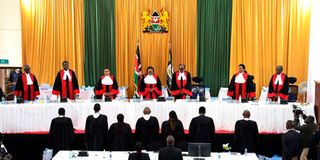Supreme Court to decide on NSSF, workers’ pension deal

The seven-judge bench led by Chief Justice Martha Koome at the Supreme Court on Wednesday, August 31, 2022.
Workers with superior pension schemes could be exempt from higher contributions to the National Social Security Fund (NSSF) if a deal between workers’ unions and the fund is endorsed by the Supreme Court tomorrow.
In a proposal for a settlement that is pending before the apex court, lawyers representing various parties are negotiating to bring the matter to a close.
The matter escalated to the Supreme Court after the appellate court overturned a decision blocking the implementation of the NSSF Act 2013, which saw the monthly contributions increase tenfold.
“We have instructions to initiate negotiations on a mutually agreeable settlement of the dispute embodied in the above cases, which essentially revolves around the subjection of previously exempt employees to mandatory NSSF membership,” the letter by lawyer Muthomi Thiankolu, who is representing the County Pensioners Association, stated.
Dr Thiankolu said the association believes restoring the previous exemptions would resolve the dispute and mitigate the risk of collapse of the occupational benefits pension schemes industry (through the winding up of occupational pension schemes and the transfer of the members of such schemes to the NSSF).
In the draft consent sent to Fred Ngatia, who is representing NSSF, Dr Thiankolu stated: “A declaration is hereby issued to the effect that employees who are in pension schemes that offer benefits that are equal to or superior to those offered by the National Social Security Fund are exempt from the provisions of the National Social Security Fund Act, 2023.”
The consent stated that employers whose employees have pension benefits that are equal to or superior to those offered by the NSSF, as far as such employees are concerned, are exempt from the provisions of the NSSF Act, 2023.
The NSSF Act, 2013 increased salaried employees’ monthly deductions from Sh200 to Sh600 for the lowest earner and from Sh320 to Sh1,080 for top earners under a graduated scale. The upper limits on contributions are to rise every year.
Workers earning above Sh18,000 are divided into two levels of contributions — tier I and tier II. Tier I contributions are for those in respect of pensionable earnings up to the lower earnings limit of Sh6,000.
Tier II contributions are those in respect of pensionable earnings above the lower earnings limit.
Those in tier I are to contribute up to Sh720 per month, while those in tier II are to add up to Sh1,440, being contributions pegged on earnings above Sh18,000.
Workers already signed up for an occupational scheme have been offered relief since they would pay six percent of the minimum wage or Sh360 in the first year upon receiving approval from RBA. This will increase to Sh540 in the fifth year in a balance meant to cushion company-sponsored schemes from collapse since it is feared that most employers would discontinue occupation schemes and opt for the statutory fund.
The County Pensioners Association moved to the court arguing that enhanced contributions will see the State corporation become a monopoly and kill the pensions industry.
Section 18 (1) of the NSSF Act 2013 establishes the Pension Fund, and a Provident Fund while section 18 (4) provides that all persons who are subject to the Employment Act, 2007 and are over 18 years must be members of the Pension Fund.
Section 18(3) requires all those who were members of the provident fund under the old NSSF Act to open a new provident fund and employers are required to deduct the contributions from the employees’ salaries.
Both employees and employers were to remit six percent each.
The total pension contribution for both the worker and employee is supposed to be a maximum of Sh4,136, being 12 percent of the proposed maximum pensionable earnings of Sh34,476.
The NSSF Act, 2013 increased salaried employees’ monthly deductions from Sh200 to Sh600 for the lowest earner and from Sh320 to Sh1,080 for top earners. The upper limits on contributions are set to rise every year.





